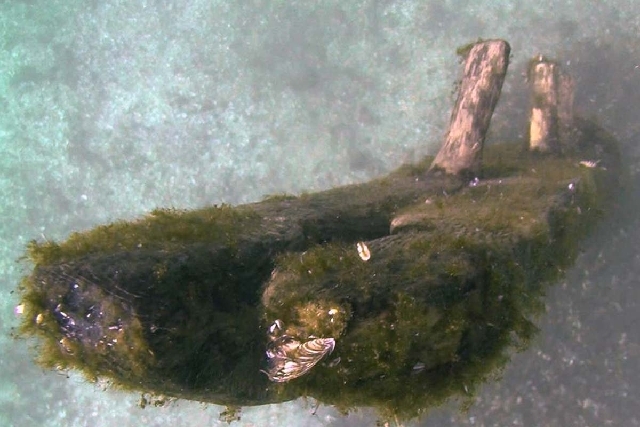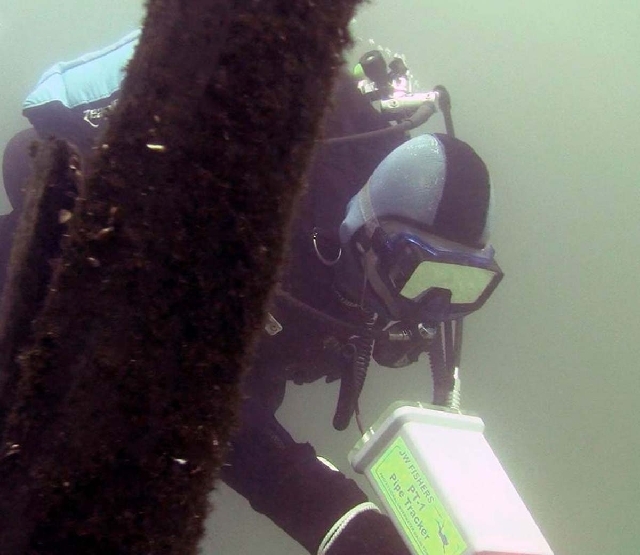Expedition hopes to find La Salle’s long lost ship
TRAVERSE CITY, Mich. — As a teenager, Steve Libert was mesmerized by a teacher’s stories of the brash 17th Century French explorer La Salle, who journeyed across the Great Lakes and down the Mississippi in a quest for a trade route to the Far East that he hoped would bring riches and renown.
Particularly intriguing was the tale of the Griffin, a vessel that La Salle built and sailed from Niagara Falls to the shores of present-day Wisconsin before sending it back for more supplies. It departed with a crew of six and a cargo of furs in September 1679 — and was never seen again. Although widely considered the first wreck of a European-type ship in the upper Great Lakes, its fate has never been documented nor its gravesite found.
After nearly three decades of research, dives and legal tussles, Libert believes he is about to solve the mystery.
Beginning this weekend, he will lead a diving expedition to an underwater site in northern Lake Michigan, where archaeologists and technicians will try to determine whether a timber jutting from the bottom and other items beneath layers of sediment are what remain of the legendary Griffin.
“I’m numb from the excitement,” said Libert, 59, a burly ex-football player who talks passionately of his mission and whose flair for adventure bears some resemblance to La Salle’s. Raised primarily in Dayton, Ohio, home of the Wright Brothers, he learned to fly before making underwater exploration his avocation.
The just-retired intelligence analyst with the U.S. Department of Defense has a passion for maritime mysteries and has journeyed from Okinawa to the Florida Keys for diving expeditions. A biography posted on his website says he’s advised searches for the Titanic, five Navy torpedo bombers lost in the Bermuda Triangle during World War II, and John Paul Jones’ warship Bon Homme Richard, among others.
But his biggest goal is finding the Griffin. “It’s the Holy Grail for the Great Lakes; it’s No. 1 on the list,” said Libert, who has homes in the Washington, D.C., area and Charlevoix, Mich.
It carried no gold or other treasure; its value is historic and cultural.
“Just to know where she went and where she is would be of great interest,” said Matthew Daley, a Grand Valley State University history professor and maritime researcher. “If we’re lucky, it also could open a window into an era that we know very little about.”
The fabled explorer, whose full name was Rene Robert Cavelier de la Salle, secured a grant from King Louis XIV of France to explore the American continent, build forts and seek the reputed passage to China and Japan. His team constructed the Griffin on the Niagara River a few miles from the falls, naming it for the mythological figure with the head and wings of an eagle and the body of a lion. Although small by modern standards — an estimated 50 feet long and 13 feet wide — it was an impressive sight on the inland seas, with its three masts, square sails and two cannons.
The vessel traversed Lakes Erie and Huron, then headed west on Lake Michigan, eventually stopping at Washington Island near the entrance to Green Bay. La Salle continued south by canoe while the Griffin prepared to retrace its journey. Father Louis Hennepin, a Catholic missionary who accompanied La Salle, wrote that the ship fired a farewell cannon blast as it glided into open water.
Among theories about its demise: It succumbed to a fierce storm; Native Americans attacked and burned the ship; mutinous crewmen scuttled it and stole the furs. Libert, who says he spent years scouring the area and studying the writings of La Salle and Hennepin, is convinced it traveled only a short distance before sinking in a gale.
His big break came in October 2001. While scuba diving near tiny Poverty Island in murky Michigan waters, he smacked into a timber sticking nearly 11 feet out of the lake bed. It looked like part of a ship, with a tapered end and fastening pegs. Carbon testing of small samples indicated it could date to the Griffin time period but wasn’t conclusive.
Libert says the water depth is less than 100 feet in the area but won’t divulge the precise location, saying other divers could loot or damage the wreckage.
Sonar surveys over the next decade suggested objects were buried in nearby sediments. But determining whether this was actually a shipwreck would require excavations.
A legal dispute slowed things. State officials said all shipwrecks in Michigan’s Great Lakes waters were government property. France later submitted a claim.
An agreement reached three years ago acknowledged France’s ownership but gave Libert’s Great Lakes Exploration Group permission to continue inspecting the site. Michigan’s Department of Natural Resources granted permits this month for digging a few shallow pits to reveal clues.
Cannons with Louis XIV’s insignia would be dead giveaways. But even without such conclusive evidence, the team hopes to find ornamental beads, knives, cooking pots or similar items that French vessels of that period likely would have carried, said archaeologist Misty Jackson, one of several scientists and technicians joining the mission.
If Libert’s team identifies the Griffin during his self-financed expedition, he’ll negotiate with the two governments over what to do next. He’d like the wreckage to be put on public display. But that would require careful planning to prevent the wood from corroding after being preserved in chilly water for more than 330 years, said Sandra Clarke, director of the Michigan Historical Center.
The agreement calls for Great Lakes Exploration Group to have exclusive rights to photos, video footage, field notes and other intellectual property from the mission for a limited period. They could use the material for books, movies and other moneymaking ventures.
Some remain skeptical that Libert has discovered the Griffin or that it remains intact. Ronald Mason, a professor emeritus in anthropology at Lawrence University in Wisconsin, said previous claims came up empty.
“I just cannot see a wooden framed sailing vessel keeping together for a prolonged period of time, given the increasing and decreasing pressures and movement of currents in fairly shallow water,” he said. “I wish them good luck. I wouldn’t want to bet money on their chances.”
Libert said he’s done his homework and believes he’ll be proved right.
“It’s a little scary after all these years,” he acknowledged. “I’ve dreamed about this being the Griffin so much. After all the research, time, money we’ve spent ... it’d be the greatest disappointment if this is not it. But even if it isn’t, we’ve opened up doors for educational opportunities, we’ve encouraged underwater tourism. And I’ll find the Griffin one day.”

























